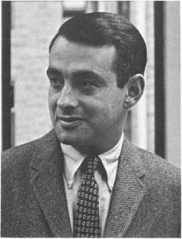Coif Award Presented at AALS Meeting

Professor Herbert Packer was chairman of the Selection Committee which this year presented the second Triennial Order of the Coif award. Coif, a national legal honor society, meets each year in conjunction with the Association of American Law Schools. This year’s AALS convention was held in Detroit and the Coif award was made at a luncheon meeting December 29. Grant Gilmore of the University of Chicago author of Security Interests in Personal Property) was the recipient.
In explaining the Selection Committee’s choice Mr. Packer said in part:
Our Committee has not adopted a statement of reasons, but I shall exercise the Chairman’s prerogative of stating some of them: Grant Gilmore’s work exhibits the singular power of the single human mind, not likely to be matched by any team or committee or task force, to impose a kind of order on unruly and recalcitrant facts to see a piece of reality in a new way. His field has been traditionally obscure, technical, particularistic, rule-ridden. Through his labors and those of others, especially the late Karl Llewellyn, a statutory tour de force has illuminated the field. And now, by a superb act of critical detachment, Professor Gilmore has reappraised that reappraisal, set it in its historic perspective, analyzed its central problems and unsparingly criticized its deficiencies. He is no builder of closed systems; he substitutes no new dogmas for the old ones. If his treatise is “definitive”-and it is-that quality inheres in its recognition that soundly conceived legal doctrine is simply a starting point for thinking about a problem in its context. Finally, Grant Gilmore exhibits a lucidity and grace in this, as in his other works, that stands as a reproach to those who think that style is somehow separate from substance. The mind at work in these pages is fastidious, ironic, aristocratic. These are not qualities that are much in vogue today; they are qualities that are worth celebrating when brought, as here, to the solution of significant legal and intellectual problems.
Mr. Gilmore’s speech of acceptance points up what Mr. Packer called “lucidity and grace.”
I have often thought that the distinguishing mark of our peculiar profession is its essential loneliness. There are many honorable ways of making a living-indeed of coping with life-in which you know to start with what it is that you are supposed to be doing and will in due course be told whether or not you have succeeded in doing it. We are like spies in an alien land, cut off from any contact with headquarters, with no way of ever finding out whether the intelligence which we diligently collect and relay is what is required of us or is even relevant to our vague and ambiguously stated mission.
We do something called teaching. But we all know from bitter personal experience that nothing is, or can be, taught once we get beyond the communication to small children of the basic mysteries on which civilization depends-how to read, how to write, how to count. We can of course pump students full of facts or even brainwash them – but pumping facts is a waste of everybody’s time and washing brains in public is, as Justice Holmes might have told us, dirty business. Learning is what the students are there for and all we know about learning is that, on any level of complexity, it is every man for himself and by himself, imposing a perhaps delusive formal pattern on the swirling chaos by a prodigious effort of the individual will. It may be that we can stimulate, or irritate, an occasional student into undertaking this arduous task-but, if we do so, it will be much more by accident than by our own design. Karl Llewellyn once observed that the function of the law teacher is not to let the true light shine: he was wise to content himself with that negative formulation.
We also engage in something called research and scholarship. We write learned articles and books we draft Codes and Restatements, we publish or we perish – sometimes we do both. In our articles and books and Codes and Restatements we are indeed concerned to let the true light shine. We aim at a hammerlock on certainty, a stranglehold on truth. In the ecstasy of struggle it is hard not to succumb to the illusion that we have, once and for all, wrestled our adversary to the ground. But time, which outwits us all, will presently reveal the boundless extent of our ignorance, our limitless capacity for self-deception. Still, if you can stand the loneliness, it’s a good life. But it is heartwarming, I must confess, once in a while to be invited to come in out of the cold.
I thank you.
